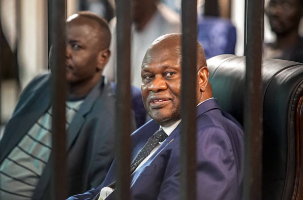South Sudanese security personnel on Wednesday barred independent journalists and media outlets from the trial of the country’s suspended First Vice President, Riek Machar, contradicting court assurances that the proceedings would be public.
Only the state-run South Sudan Broadcasting Corporation (SSBC) was permitted to cover the hearing at Juba’s Freedom Hall.
Security officers stationed at the entrance turned away other journalists without providing an explanation, raising immediate concerns from media and human rights groups about transparency and press freedom.
Speaking to Radio Tamazuj, human rights activist Ter Manyang condemned the move, saying it directly contradicted the court’s promise of openness.
“I urge the court to remain committed to its promise of transparency,” Manyang said. “The public has the right to be informed about what is happening inside the courtroom.”
Manyang warned that restricting independent media coverage could erode public trust. “Without openness, the public may begin to doubt the fairness and legitimacy of the trial,” he said.
He further appealed to security forces to act professionally and respect the constitutional role of the press. “Security forces must support, not obstruct, the lawful work of journalists,” he said.
The Association for Media Development in South Sudan (AMDISS) issued a statement expressing concern and urging authorities to grant accredited reporters access.
“If there are any issues, AMDISS appeals for dialogue to find an amicable solution,” said Juma Peter, the organization’s advocacy and communication manager. The group called for adherence to both South Sudan’s journalistic code of ethics and existing court regulations.
The South Sudan Human Rights Defenders Network (SSHRDN) also condemned the exclusion, calling it “a direct assault on the fundamental right to a free press and an independent judiciary.”
James Bidal, Head of Secretariat at SSHRDN, stated that the action “undermines the principles of transparency, accountability, and the public’s right to information.” He urged authorities to reverse the decision and facilitate unrestricted media access to maintain public trust.
Machar, a key figure in a 2018 peace deal that ended a civil war, was suspended and placed under house arrest in March. He and seven others face charges including murder, treason and crimes against humanity in a special court established in Juba.
The charges are linked to a March attack on a military base in Nasir, Upper Nile state, that the government says killed more than 250 soldiers and was carried out by the White Army militia under Machar’s direction.




